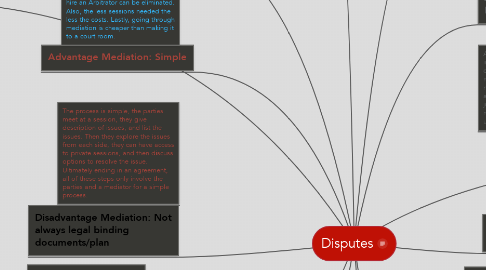Disputes
by Kylee Mcnutt

1. Disadvantage Mediation: Uncompromising
2. Advantage Mediation: Cheap
3. Advantage Mediation: Simple
4. Disadvantage Mediation: Not always legal binding documents/plan
5. Disadvantage Mediation: Required Sessions
6. Advantage Mediation: Quick
7. The time of ADR can be as fast or as drawn out as the parties want. The meetings/sessions can be quickly met and a solution found.
8. The process is quick enough so not many expenses arise. The need to hire an Arbitrator can be eliminated. Also, the less sessions needed the less the costs. Lastly, going through mediation is cheaper than making it to a court room.
9. The process is simple, the parties meet at a session, they give description of issues, and list the issues. Then they explore the issues from each side, they can have access to private sessions, and then discuss options to resolve the issue. Ultimately ending in an agreement, all of these steps only involve the parties and a mediator for a simple process.
10. Sometimes at the end of the mediation and an agreement is placed, the end result sometimes isn't a legal binding plan or document. This can lead to the other party not feeling confident in their ADR process. Even though the parties came to an agreement the legal binding plan/document isn't provided unless agreed upon prior to the end decision,
11. Another disadvantage is wasted time when parties are not wanting to compromise or put in appropriate effort. The less effort put in will result in the wasted time on the sessions and the end result being the parties attending a court date. The wasted time will also result in a longer delay in the finding of the final decision made by a mediator or a arbitrator or even a judge in the court room.
12. The required sessions and requirement of showing up are disadvantaged because the sessions would be based upon availability of each part. Also, if a session is missed it could cause the mediation to fail.
13. Mediator Qualifications:
14. 1: Open for availability for sessions and meetings regarding the dispute.
15. 2: The mediator must have the willingness to help both parties come to an agreement or compromise during the process.
16. 3: The mediator preferably is experienced in ADR or is trained in the mediation process to lead the parties successfully into an agreement.
17. 4: The mediator is unbiased and seeks a compromise that benefits all parties involved so that the process comes to a compromise and solution to the dispute.
18. 5: The mediator must possess the ability to go through the proper process; introduction, description of issues, listing of issues exploration of issues, provide private sessions if requested, discuss options to resolve the dispute and lastly help form the agreement.
19. Arbitration Advantage: Quick
20. Arbitration Advantage: Arbitrators More Educated/Unbias
21. Arbitration Advantage: Best Solution for whole situation
22. Once the situation has hit the arbitration level, and once the arbitrator is chosen the process goes quickly since only one person is in control of the end result decision.
23. Arbitrators are more educated, informed and unbiased, so the decision is based upon the best result for the whole situation and not just one party or the other. The arbitrator is usually a lawyer or judge, or someone who has a reputation for fairness and unbiased.
24. In an arbitration, the decision is made for the better of the whole situation, so the decision will be clear and fairly. The decision isn't based on a common ground found between the parties, it is a decision made by the Arbitrator for the greater good of the dispute.
25. Arbitration Disadvantage: Choice of Arbitrator
26. The arbitrator is chosen based on many qualities, but isn't going to make a decision that benefits everyone. The arbitrator can be; educated or uneducated, fair or stern, quick or slow at decision making.
27. Arbitration Disadvantage: Cost/Time
28. An arbitration can be costly when finding the appropriate arbitrator, and could take longer to find one appropriate for the dispute. The cost of the setting for the arbitration or the cost of time spent on sessions, and possible judgment costs.
29. Arbitrator Qualifications:
30. 1: The arbitrator must be unbiased, meaning they must be focused on the best result for the situation and not any particular party involved.
31. 2: The arbitrator must be fair, meaning they must obtain all information from all parties involved, make a decision that is fair for the situation, and is making the decision as the best for the dispute.
32. 3: The most desirable arbitrator is listed on the American Arbitration Association or the Federal Mediation and Conciliation Services due to their exceptional work.
33. 4: The arbitrator is not bound by any precedents, and is not bribed, paid, or influenced in any way to favor one party's side over another.
34. 5: The arbitrator must be open, available for meetings, and possess the ability to make the best judgement decision regarding the dispute for the greater good.


